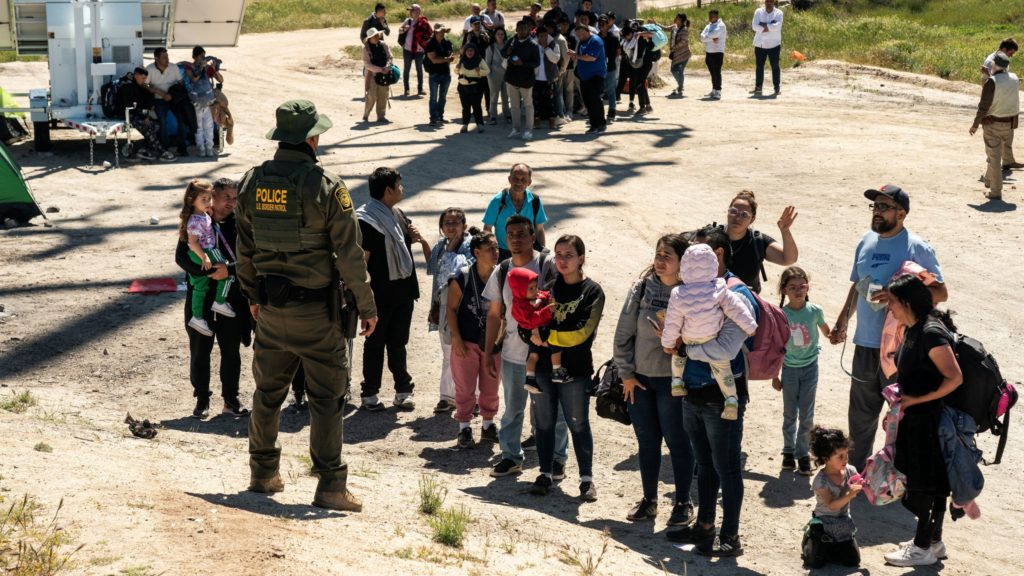Catholic immigration advocates are paying close attention to -- and expressing concern about -- a possible change in how asylum claims are processed by U.S. immigration officials, as well as updates in the use of classified information in immigration proceedings.
"We are reviewing the proposed rule carefully," Chieko Noguchi, spokesperson for the U.S. Conference of Catholic Bishops, told OSV News. "In the meantime, the bishops remain committed to supporting policies that respect the sanctity of human life wherever it may be found, to include both sides of the U.S.-Mexico border."
"We are dismayed to see yet another instance of a proposed rule to further restrict the lawful right to seek asylum," Anna Gallagher, executive director at Catholic Legal Immigration Network (CLINIC), told OSV News in a statement.
On May 9, the Department of Homeland Security announced a "Notice of Proposed Rulemaking" that would allow statutory bars to asylum claims to be applied "much earlier in the process." The 52-page notice will be published May 13 for a 30-day public comment period ending June 12.
If effected, the proposed rule change would authorize U.S. asylum officers to assess and deny claims of asylum during what is known as the initial "credible fear screening" -- where an individual details actual or feared persecution experienced in the country of origin due to race, religion, nationality, membership in a particular social group or political opinion.
Such conditions are the basis for granting asylum under U.S. law, which requires that applicants be physically present in the U.S. and seek protection within one year of their arrival. There are no caps on the number of those who can seek asylum, the principle for which is articulated in the United Nations' principle of non-refoulement, which protects individuals from being returned to situations where their life or freedom would be endangered. However, President Biden is reported to be considering invoking executive powers to restrict entry under section 212(f) of the Immigration and Nationality Act, part of Title 8.
Asylum can be denied under U.S. law on the grounds of terrorism, national security or criminality, and the proposed rule change would allow asylum officers "to consider these bars to asylum and withholding of removal … just days after an individual is encountered," enabling DHS "to expeditiously remove individuals who pose a threat to the United States much sooner than is currently the case," said the agency.
A November 2023 report by The New York Times found that asylum applications had soared 63% in the year prior, with more than 800,000 filed. More than 2 million cases were in the backlog, with fewer than 1,500 total judges and asylum officers to decide on claims. Wait times ranged from three to 10 years.
Yet the proposed rule "only further entrenches our country in the wrong direction on asylum policy," said Gallagher, noting that a ban on asylum proposed by the Biden administration in 2023 "was immoral and contrary to the teachings of our faith to welcome the stranger and shelter the oppressed."
Jesús de la Torre, research fellow at the Hope Border Institute in El Paso, Texas and Ciudad Juárez, Mexico, posted on X (formerly Twitter) that the proposed rule would "undermine due process, send potential refugees back to the border and do nothing to address humanitarian needs at the border."
"In this reality, failing your fear interview is almost a synonym for quick deportation (unless you have the rare luck of having legal counsel)," he wrote. "Adding another bar to an already cruel, faulty process may send more bona fide asylum seekers into danger. In sum, this new rule does nothing but increase the pain and confusion exerted against people seeking safety at the U.S.-Mexico border."
De la Torre also voiced doubts about "US reliance on information from authoritarian governments clamping down on human rights … to determine who might be a 'national security threat' or a 'criminal.'
"If you're fleeing from your government, but your government included you in a database saying you were a criminal, this new rule makes it more likely that you won't even have a case to present your claim, and you will be deported to the hands of that government," wrote De la Torre. "Utterly cruel."
"Church teaching clearly acknowledges the right of countries to maintain their borders and regulate immigration, consistent with the common good," said Noguchi. "That same teaching also recognizes the right of those fleeing persecution and other conditions to seek protection. As the USCCB has reiterated several times in recent months, ensuring due process for noncitizens remains an important component of this."
In its announcement, DHS noted it had updated its policies and procedures on "the use of classified information in immigration proceedings," clarifying the circumstances in which such information would be used. Details regarding the updates were not specified in the announcement. OSV News has contacted DHS for comment and is awaiting a response.
In addition, DHS stressed that it continued to enforce the Circumvention of Lawful Pathways rule, which incentivizes orderly immigration processes while imposing asylum eligibility conditions on and expediting removal for those who do not comply. The agency's U.S. Citizenship and Immigration Services division has issued revised guidance to asylum officers, who will "consider whether an asylum seeker could reasonably relocate to another part of the country of feared persecution in all credible fear cases." OSV News is awaiting a response from DHS and USCIS on how asylum officers will evaluate such relocation prospects.

